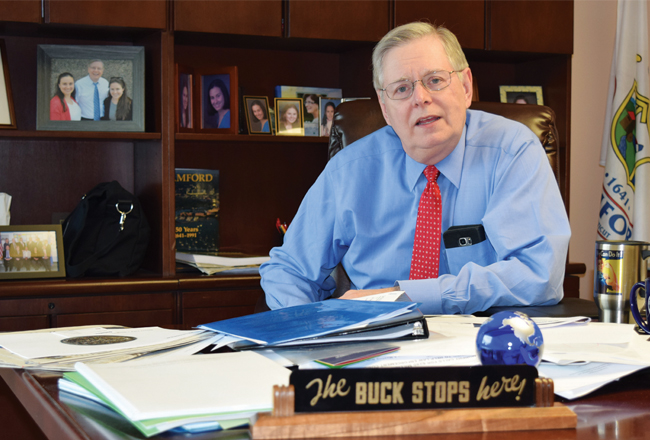U.S. Hispanic small-business owners and entrepreneurs are anticipating a decade of robust expansion and growth, a brighter outlook than their non-Hispanic peers have for the year ahead, according to the fourth annual Bank of America Business Advantage 2020 Hispanic Business Owner Spotlight.
“What we”™re seeing are big numbers,” Bank of America Vice President, Small Business Manager Jamie Anderson told the Business Journal. “Our report shows that this segment is extremely positive about where the economy is and where it”™s going, which should bolster confidence for 2020 and the decade ahead for every sector.”

The cohort has expressed a bullish attitude in each of the four years the bank has published the survey, Anderson noted.
“These figures are at or near all-time highs,” he said.
The study, based on a survey of more than 1,000 entrepreneurs across the country, revealed:
Ӣ 89% of Hispanic small-business owners plan to expand over the next 12 months (vs. 68% of non-Hispanic entrepreneurs, and up from 87% in 2019).
Ӣ 79% expect their revenue to increase in the year ahead, a four-year high (vs. 57% of non-Hispanic entrepreneurs, and up from 74% in 2019).
Ӣ 45% plan to hire in 2020 (vs. 24% of non-Hispanic small-business owners, and down from 51% in 2019).
Ӣ 78% plan to obtain financing over the next 12 months (vs. 49% of non-Hispanic entrepreneurs). The top three ways Hispanic entrepreneurs intend to obtain financing are tapping into personal savings (38%), applying for a bank loan (31%) and using personal credit cards (23%).
DECADE OF OPPORTUNITY
Hispanic entrepreneurs view the decade as one of opportunity as 92% of business owners say they believe the small-business environment will strengthen for their community over the next five years, and 90% have set ambitious goals to advance or grow their business in the decade.
Their top five goals over the next 10 years include: significantly increasing revenue (57%), prioritizing the digital presence of their business (45%), expanding into new markets (34%), significantly increasing staff (30%) and automating business operations (29%).
Also, 62% of Hispanic small-business owners are confident their local economy will improve in the year ahead (vs. 52% of non-Hispanic entrepreneurs, and down from 68% in 2019), and 53% are confident the national economy will improve over the next 12 months (vs. 49% of non-Hispanic small-business owners, and down from 59% in 2019).
Health care costs remain the most worrisome economic issue for Hispanic entrepreneurs at 63%, though concern fell to the lowest level since the survey began in 2017.
Other top concerns of Hispanic business owners in 2020 include the political environment (59%), strength of the U.S. dollar (59%), commodities prices (56%), consumer spending (56%) and interest rates (55%).
Hispanic/Latino businesses in the area total 21,309 in Fairfield County and 33,391 in Westchester, according to the latest U.S. Census data.
According to a study from Stanford University, the number of Latino business owners grew 34% over the last decade, compared to 1% for all business owners in the U.S. That study also found that Latino-owned businesses contributed about $500 billion to the economy in annual sales.
A 2019 report to Congress based on data from 2017 found almost 60 million Latinos in the nation accounted for $2.3 trillion in economic activity in total, which would equate to the eighth-largest economy in the world. With Latinos projected to make up 30% of the U.S. population this year, the group’s contributions are only likely to grow.
Latino-owned businesses employ more than 3 million people, according to the Stanford study, accounting for about 4% of U.S. business revenues and 5.5% of U.S. employment.
However, Latino-owned companies remain smaller than white-owned firms, averaging $1.2 million in revenue compared with $2.3 million brought in by a white-owned company.
THE ELECTION LOOMS
Anderson remarked that election years are always a source of apprehension, especially as the 2020 presidential election nears.
According to the Pew Research Center, Latinos are poised to be the largest racial or ethnic minority group to be eligible to vote in a presidential election, with an estimated 32 million potential voters, compared with about 30 million African-Americans. Latinos are expected to make up about 13.3% of the electorate this year, according to Pew.
The BofA report found that a lack of resources, lack of expertise and access to capital were cited as the top challenges small-business owners face. Anderson said the “lack of expertise” concern is a by-product of how quickly the businesses are expanding.
Bank of America has 450,000 Hispanic small-business owners as customers, representing 14% of its 3.3 million small-business clients. Its Spanish-language mobile app has more than 2 million users, representing a 23% year-over-year growth rate.

















